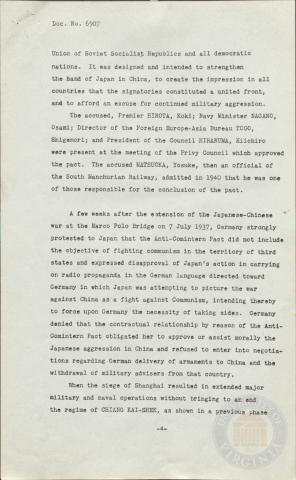
Page 4
| Parent | Doc. 6907 - Collaboration Between Japan, Germany and Italy, Volume 1 - Opening Statement |
|---|---|
| Date | |
| Language | English |
| Collection | Tavenner Papers & IMTFE Official Records |
| Box | Box 15 |
| Folder | Japan, Germany, Italy Collaboration Vol 1 |
| Repository | University of Virginia Law Library |
Doc. No. 6907
Union of Soviet Socialist Republics and all democratic nations. It was designed and intended to strengthen the hand of Japan in China, to create the impression in all countries that the signatories constituted a united front, and to afford an excuse for continued military aggression.
The accused, Premier HIROTA, Koki; Navy Minister NAGANO, Osami; Director of the Foreign Europe-Asia Bureau TOGO, Shigenori; and President of the Council HIRANUMA, Kiichiro were present at the meeting of the Privy Council which approved the pact. The accused MATSUOKA, Yosuke, then an official of the South Manchurian Railway, admitted in 1940 that he was one of those responsible for the conclusion of the pact.
A few weeks after the extension of the Japanese-Chinese war at the Marco Polo Bridge on 7 July 1937> Germany strongly protested to Japan that the Anti-Comintern Pact did not Include the objective of fighting communism in the territory of third states and expressed disapproval of Japan's action in carrying on radio propaganda in the German language directed toward Germany in which Japan was attempting to picture the war against China as a fight against Communism, Intending thereby to force upon Germany the necessity of taking sides. Germany denied that the contractual relationship by reason of the Anti- Comintern Pact obligated her to approve or assist morally the Japanese aggression in China and refused to enter into negotia¬tions regarding German delivery of armaments to China and the withdrawal of military advisers from that country.
When the siege of Shanghai resulted in extended major military and naval operations without bringing to an end the regime of CHIANG KAI-SHEK, as shown In a previous phase
